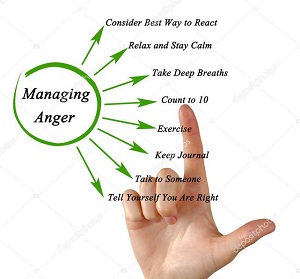
Anger causes physical and emotional symptoms. While it’s normal to experience these symptoms on occasion, a person with anger issues tends to experience them more often and to a more severe degree.
Physical symptoms
Anger affects different parts of your body, including your heart, brain, and muscles. A 2011 study found that anger also causes an increase in testosterone levels and decrease in cortisol levels.
The physical signs and symptoms of anger include:
- increased blood pressure
- increased heart rate
- tingling sensation
- muscle tension
Emotional
There are a number of emotions that go hand in hand with anger. You may notice the following emotional symptoms before, during, or after an episode of anger:
- irritability
- frustration
- anxiety
- rage
- stress
- feeling overwhelmed
- guilt
Anger can manifest itself in a number of different ways. Not all anger is expressed in the same way. Anger and aggression can be outward, inward, or passive.
- Outward. This involves expressing your anger and aggression in an obvious way. This can include behavior such as shouting, cursing, throwing or breaking things, or being verbally or physically abusive toward others.
- Inward. This type of anger is directed at yourself. It involves negative self-talk, denying yourself things that make you happy or even basic needs, such as food. Self-harm and isolating yourself from people are other ways anger can be directed inward.
- Passive. This involves using subtle and indirect ways to express your anger. Examples of this passive aggressive behavior include giving someone the silent treatment, sulking, being sarcastic, and making snide remarks.
You may have anger issues if:
- you feel angry often
- you feel that your anger seems out of control
- your anger is impacting your relationships
- your anger is hurting others
- your anger causes you to say or do things you regret
- you’re verbally or physically abusive